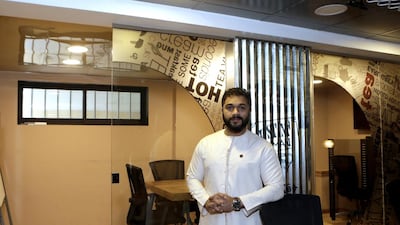When Rafih Filli took over his father’s ailing Al Zumalaa Cafeteria – nestled among small convenience stores in Dubai’s Al Mamzar neighbourhood – in 2003, he would pray every night for it to make just enough money so that he could pay the staff salaries.
Little did he know that a slight tweak to the menu, which mostly featured shawarma sandwiches and fresh juices, would lead to a change of direction and a chain of cafes he hopes might rival chains such as Starbucks in the next 10 years – all thanks to a strong cup of freshly brewed chai.
Born Abdul Rafih, Filli was a nickname given to him by friends when he was in high school. So when he came up with his special recipe for the milky tea he added to the cafe’s menu in 2004, he called it Filli.
At the same time he took down the Zumalaa sign that had been on the front of the business since 1991 and renamed it Filli Cafe – and even went so far as to change his surname to match.
But even as the Filli brand expands across the UAE – there are already 27 additional outlets, with the goal of opening 100 in the region by 2020 – time has stood still in Al Mamzar, where the “hole-in-the-wall” tea shop sells about 5,000 cups of the piping hot beverage each weekend.
The other Filli cafes sell not only the popular saffron tea but also burgers, wraps and even the Chips Oman paratha roll. The first in Abu Dhabi – a 2,500-square-foot cafe with outdoor seating – is due to open on Airport Road within the next two months.
More stores are planned in Sharjah and Ajman, too, but Filli’s ambitions extend far beyond the Emirates. Soon Filli Cafes will be popping up in Qatar, Bahrain, Saudi Arabia, India and even London, as its 34-year-old Indian founder, from Kerala, has franchised his business.
“My dad left the country when the cafeteria started failing, so I stepped in to help run it,” says Filli. “I was only 21 then. After three months, I added tea to the menu – this was tea the way I like it.”
It took a while to convince the customers, however.
“They were unsure because they didn’t get why tea tasted so flavourful,” he says. “The crowd that was coming were the staff of the local families living in the area. They thought I was adding something extra.” After a month of playing around with the recipe and offering free samples, he began attracting a steady stream of loyal daily customers.
“There is no secret recipe,” he says, revealing that the distinctive flavour boils down to the ratios of Assam tea, milk and sugar. “And lots of brewing, of course,” he adds.
To prepare for the weekend rush after the Maghreb prayer, head brewers Siraj and Zafeer are usually at the original cafe, near Al Mamzar beach, several hours ahead of time. They start by putting several pots of tea on the stove in the compact kitchen that doubles as an order counter. The tea is then poured into large vacuum flasks.
Two short honks from a white Mercedes has Zafeer rushing out of the kitchen to take the order. The driver rolls down his tinted window just enough to gesture for two “zaafran chai”.
The deafening cacophony of honks grows and continues as more customers arrive, signalling to servers from their cars. Siraj pours the tea into cups and dusts the tops with saffron powder. They work together as a well-oiled machine to serve the thousands of cups. Some customers leave to enjoy their hot tea on the corniche. Others hang around, leaning on their vehicles, slowly sipping their tea and chatting.
“We can’t renovate this shop,” says Filli, about the original cafe. Here, even the price of the smallest cup of tea is cheaper – Dh3 compared with Dh5 at the other cafes.
“I can’t close this one for even a day for any renovation because of the number of customers we get here.”
Instead, Filli opened a more modern cafe across the street a few years ago.
“So we are giving them the best of both worlds in the same place,” he adds.
Adeep Eswar, a mechanical-engineering student, prefers to get his tea at the original outlet because he feels it has more character.
“There is something quite unpretentious about this place,” says the 21-year-old Dubai resident. “We are here every weekend. It’s nice because sometimes we grab a chai and head to the Mamzar Corniche.”
Fida Hussain, a lorry driver from Pakistan, says it is a treat to head to the cafe after a long day at work.
“It’s our kind of tea, the Kashmiri chai,” says Hussain, who has been visiting the cafe for three years. “It’s also just the right price – not expensive.”
At the other cafes, Filli is focused on creating a more youthful ambience.
“I want people to sit and chat for hours, without worrying about ordering,” he says. “We want this to be their second home.”
That modern outlook is reflected in the menu.
“We have even hired a chef from Singapore to spruce up the menu and add more healthy options because that’s what people want now,” he says. “The teas will remain the same.”
While Filli is clearly proud of his tea, he admits there is one person who does it better.
“While the rest of the country prefers the Filli tea, I think my wife makes the best tea.”
aahmed@thenational.ae

